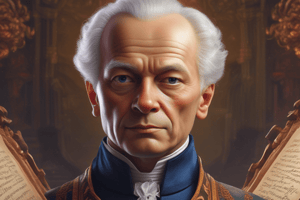Podcast
Questions and Answers
What did Immanuel Kant claim in his article 'An Answer to the Question: What Is Enlightenment'?
What did Immanuel Kant claim in his article 'An Answer to the Question: What Is Enlightenment'?
Immanuel Kant claimed that an enlightened age would be one in which each individual used their judgment.
What are some of the disciplines that were radically transformed during the Age of Enlightenment?
What are some of the disciplines that were radically transformed during the Age of Enlightenment?
Some of the disciplines that were radically transformed during the Age of Enlightenment include natural science, political theory, and religion.
Who are some of the famous Enlightenment thinkers mentioned in the text?
Who are some of the famous Enlightenment thinkers mentioned in the text?
Some of the famous Enlightenment thinkers mentioned in the text include Immanuel Kant, Isaac Newton, John Locke, David Hume, Adam Smith, Baron de Montesquieu, and Benjamin Franklin.
What are some key principles of the Enlightenment?
What are some key principles of the Enlightenment?
Who were two influential Enlightenment thinkers from the United Kingdom?
Who were two influential Enlightenment thinkers from the United Kingdom?
What were the main differences between Locke's and Hobbes' social contract theories?
What were the main differences between Locke's and Hobbes' social contract theories?
What was Rene Descartes' theory of knowledge?
What was Rene Descartes' theory of knowledge?
What did Baron de Montesquieu advocate for in his book 'The Spirit of the Laws'?
What did Baron de Montesquieu advocate for in his book 'The Spirit of the Laws'?
What was the goal of Jean le Rond d'Alembert and Denis Diderot with their Encyclopedie?
What was the goal of Jean le Rond d'Alembert and Denis Diderot with their Encyclopedie?
Who were two American Enlightenment thinkers mentioned in the text?
Who were two American Enlightenment thinkers mentioned in the text?
Flashcards are hidden until you start studying
Study Notes
Immanuel Kant and the Age of Enlightenment
- Immanuel Kant published "An Answer to the Question: What Is Enlightenment" in the 18th century, claiming that an enlightened age would be one in which each individual uses their judgment.
- The Age of Enlightenment, also known as the Age of Reason, lasted roughly through the 17th and 18th centuries and valorized the ability of individuals to use rational judgment to overcome superstition and blind authority.
- The epoch saw the rise of empiricism, rationalism, social contract theory, Newtonian physics, and deism.
Key Enlightenment Thinkers
- Immanuel Kant, Isaac Newton, John Locke, David Hume, Adam Smith, Baron de Montesquieu, and Benjamin Franklin were prominent Enlightenment thinkers.
- They contributed to fields such as natural science, political theory, and religion.
Enlightenment Principles
- Rightful power should be separated, as advocated by Baron de Montesquieu.
- The rational powers of the individual can discover the truth, as advocated by David Hume.
- The observable world can be explained in rational terms, as demonstrated by Isaac Newton's work in physics.
United Kingdom Enlightenment Thinkers
- John Locke, a prominent Enlightenment thinker, made contributions to political theory, epistemology, and metaphysics.
- He developed the social contract theory, which posits that humans can imagine a state of nature in which there is no government.
- Thomas Hobbes, another social contract theorist, believed in a stronger government, while Locke's view was more docile.
French Enlightenment Thinkers
- Rene Descartes offered a theory of knowledge that emphasized individual critical scrutiny and method to attain genuine knowledge.
- Baron de Montesquieu published "The Spirit of the Laws," a major contribution to political theory that advocated for constitutional government and the principle of "checks and balances."
- Jean le Rond d'Alembert and Denis Diderot's "Encyclopedie" attempted to collect and organize all human knowledge, assuming progress could be achieved through reason.
American Enlightenment Thinkers
- Benjamin Franklin was an American Enlightenment thinker, scientist, and founder who studied electricity and published "Poor Richard's Almanac."
- James Madison, another American Enlightenment thinker, was the architect of the United States Constitution and a contributor to the Federalist Papers.
Studying That Suits You
Use AI to generate personalized quizzes and flashcards to suit your learning preferences.




